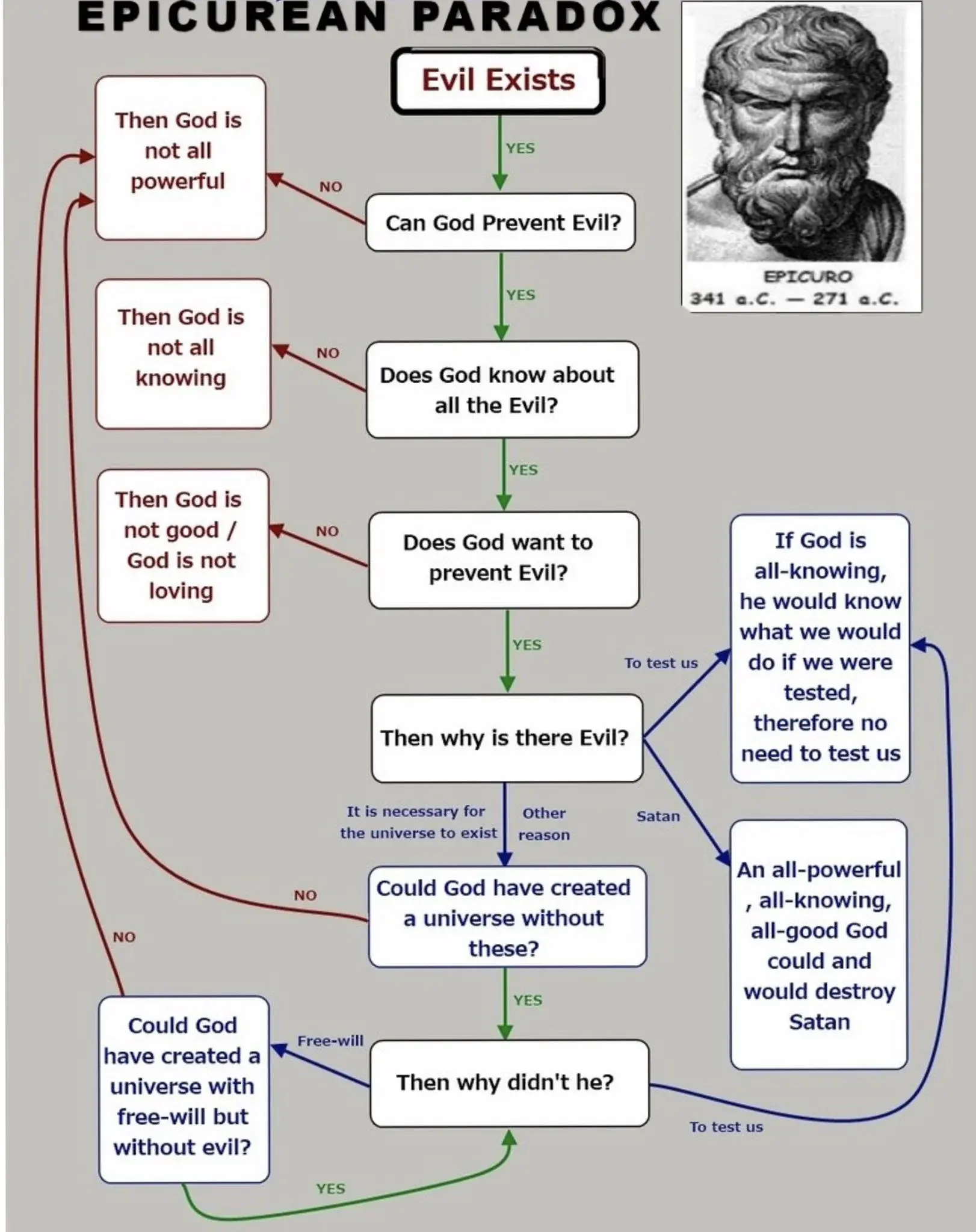A cool guide to Epicurean Paradox
A cool guide to Epicurean Paradox


A cool guide to Epicurean Paradox


You're viewing a single thread.
The problem with the argument is that evil is relative, and the relative knowledge of what is or isn't is something subjectively decided, not something inherently known.
We don't know if evil is relative, but you can follow the dilemma with different wording.
We don't like our wellbeing and our ability to make our own decisions taken away from us. We suffer, which is something we want to avoid in general terms. It goes beyond humanity, as many animals also seem to seek the satisfaction of their will (being it playing, feeding, instinctively reproducing, etc.) and seem adverse to harm and to losing their life.
So... If we are such creatures, it's natural we don't like situations and beings that go against this. We don't like volcanic eruptions when they're happening with us close the crater. We don't like lions or bears attacking us. We especially don't like other humans harming us as we suspect they could have done otherwise in many cases. We simply don't like these things because of our 'programming' or 'design'.
Problem? There are a few. The first is God asks us to like him when he's admitting that he is actively doing the things we dislike almost universally as human beings. That makes us fall into internal conflict and also into conceptual dilemmas. Perhaps due to our limitations, but nonetheless real and unsolvable to us.
Then you can argue that the way we are is designed by him, so why design something that is going to live, feel, think certain things as undesirable and then impose such things unto them? Let's say I cannot say that's evil, I at least can say it's impractical as it will certainly cause trouble to his mission of accepting him (and following him). If that obstacle for us is part of the plan, that's not for me to say, yet it is an obstacle in our view and experience. In human terms, all this might be classified as unfair or sadistic, which is the reasoning in the guide and how you can follow it in this perhaps closer way.
Now, about this last part, while we can argue that those terms arise from our own dispositions and might be different to other dispositions (aliens that do not experience pain, for example), is that enough to invalidate our perspective? Then what's the place of empathy, which I am assuming is also a part of God's gifts to us? What's the place of compassion, as written in many religious texts of supposedly divine inspiration? If we need to carry our dispreference, displeasure, dislikeness—suffering—and not to classify it as necessarily evil when the gods impose it to us (as it is our judgment only), then why classify it as evil in other circumstances?
I hope I am getting my new point though. What this all seems to conclude is that if the lack of respect for the suffering of the animal kingdom is not worthy of being classified as bad (for whatever reason, here I argued that because this comes to be only by our characteristics/disposition); if, therefore, we cannot say a god is evil for going against our wellbeing and against our ability to make our own decisions, then I fail to understand many other things that tend to follow religious thinking and even moral thinking.
You're getting too caught up in one particular concept of 'God' (why is it a 'he' even?).
Epicurus wasn't Christian. Jesus doesn't even come along until centuries later.
There are theological configurations in antiquity very different from the OT/NT depictions of divinity which still have a 'good' deity, but where it is much harder to dispute using the paradox.
For example, there was a Christian apocryphal sect that claimed there was an original humanity evolved (Epicurus's less talked about contribution to thinking in antiquity) from chaos which preceded and brought about God before dying, and that we're the recreations of that original humanity in the archetypes of the originals, but with the additional unconditional capacity to continue on after death (their concept of this God is effectively all powerful relative to what it creates but not what came before it).
If we consider a God who is bringing back an extinct species by recreating their environment and giving them the ability to self-define and self-determine, would it be more ethical to whitewash history such that the poor and downtrodden are unrepresented in the sample or to accurately recreate the chaotic and sometimes awful conditions of reality such that even the unfortunate have access to an afterlife and it is not simply granted to the privileged?
The Epicurian paradox is effective for the OT/NT concepts of God with absolute mortality and a narcissistic streak, and for Greek deities viewed as a collective, and a number of other notions of the divine.
But it's not quite as broadly applicable as it is often characterized, especially when dealing with traditions structured around relative mortalities and unconditionally accepted self-determination as the point of existence.
Would you be willing to provide more info regarding the sect you're referencing, for instance the name? I have a fascination with "original" gnostic/apocryphal beliefs, but this one is extremely intriguing & I want to learn more.
You probably already know about it, you might just not know that you know about it.
The core of the Gospel of Thomas is pretty clearly a response to Lucretius which then used Platonist concepts of the demiurge and eikons (essentially archetypes) to build on top of the Epicurean foundations regarding a belief in a physical body that would die and a mind/soul that would die with it.
You can see how the Naassenes by the 4th century are still interpreting the seeds parables using the language of Lucretius's indivisible seeds (writing in Latin he used 'seed' in place of the Greek atomos), while at the same time talking about the original man creating the son of man and then likening their ontological beliefs to the Phrygian mysteries around spontaneous first beings described as coming to exist like a tumor.
Saying 29 of Thomas even straight up calls the notion of the spirit arising from flesh (Lucretius's evolution) to be a greater wonder than flesh arising from spirit (intelligent design) before criticizing the notion of the dependence of the spirit on the physical body in either.
If you want to look into this more, I recommend reading the following texts in parallel with each other:
Adding Lucretius into the mix as you look at the other two works will be the biggest "ah ha" you could probably have when interpreting Thomas and remnant beliefs preserved among the Naassenes. In particular, pay close attention to sayings 7, 8, 9 for a surprise, noting that 8 is the only saying after another beginning with a conjunction and that in both the parallel metaphors of Habakkuk 1 and Matthew 13 a human is a fish and not the fisherman.
If this was Reddit I'd give an award or whatever they push now. Amazing, thank you.